In recent years, the conversation surrounding marijuana has evolved significantly, with an increasing number of regions legalizing or decriminalizing its use. The need to drug test is fading away. But we are always curious how long does THC stay in your system? However, a pivotal question remains relevant regardless of these changing legal landscapes: “How long does weed stay in your system?” This common question is not only a common concern for those undergoing employment drug tests but also for individuals mindful of their health and well-being. In this comprehensive guide, we delve deep into understanding the dynamics of THC – the primary psychoactive component in cannabis – and its longevity in the human body.
The duration that weed remains detectable in your system is influenced by a myriad of factors, ranging from the frequency of usage to individual metabolic rates. It’s crucial to recognize that THC, or tetrahydrocannabinol, doesn’t follow a uniform timeline for every individual; personal physiological factors play a significant role. This complexity often leads to a multitude of misconceptions and misinformation regarding THC detection, which we aim to clarify in this article.
Whether you are an occasional user pondering over a forthcoming drug test or a regular user curious about the implications of prolonged usage, understanding these nuances is vital. Or for those of you that want to know How Long Does Marijuana Stay in Your System? Our guide is meticulously structured to provide you with a thorough insight into the various testing methods for THC, such as urine, blood, hair, and saliva tests, each with its unique detection window. Additionally, we explore natural ways to potentially expedite the elimination of THC from your system, while debunking common myths and highlighting safe practices.
THC: The Active Ingredient in Cannabis
Tetrahydrocannabinol, universally known as THC, is the key psychoactive compound found in cannabis plants. It is responsible for the ‘high’ sensation often associated with marijuana use. Understanding THC is critical when discussing how long weed stays in your system. THC interacts with the body’s endocannabinoid system, which plays a role in regulating a variety of functions including mood, memory, appetite, and pain sensation.
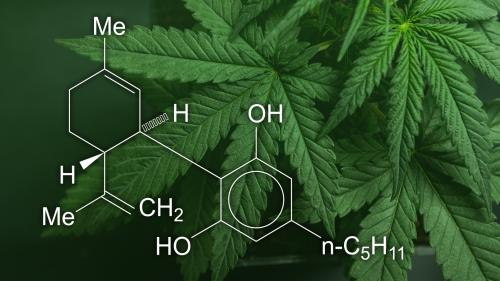
How THC Works in the Body
Upon consumption, whether through smoking, vaping, or ingestion, THC enters the bloodstream. It then travels to the brain, where it binds to cannabinoid receptors. These receptors are part of the endocannabinoid system and their activation alters normal brain communication, leading to the psychoactive effects of marijuana.
It’s worth noting that the effects of THC can vary significantly depending on the method of consumption. Inhaling it through smoking or vaping results in almost immediate effects, as THC quickly reaches the brain. In contrast, eating THC-laden edibles leads to a delayed onset of effects, as the compound must first pass through the digestive system and liver.
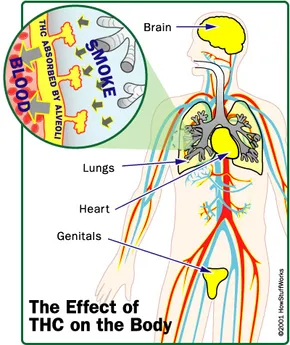
Factors Affecting THC Retention
The duration THC ( psychoactive component ) stays in your system is not a one-size-fits-all scenario; several factors play a role:
- Metabolism: Individual metabolic rates significantly influence how quickly THC is broken down and eliminated from the body. A faster metabolism typically means a quicker elimination process.
- Frequency of Use: Regular users will find that THC accumulates in their system, leading to a longer detection window. Occasional users may find that THC clears from their system more rapidly.
- Body Fat: THC is lipophilic, meaning it binds to fats in the body. Therefore, individuals with higher body fat percentages may retain THC for longer periods. A person with more body fat may experience longer THC Rentetion.
- Potency of the Weed: The concentration of THC in the cannabis product plays a crucial role. Higher potency strains lead to more THC entering the system, potentially extending the duration it remains detectable.
- Hydration and Diet: While not as impactful as the other factors, hydration levels and diet can also influence THC metabolism and excretion.
Understanding these dynamics is essential for anyone trying to gauge how long cannabis might stay in their system. Each factor contributes to the complexity of THC detection and its duration in the body, making personalized experiences highly variable.
Detection Methods and Different Drug Tests
Overview of Common Drug Test Methods
Drug screenings for marijuana use primarily look for THC, as well as its metabolites, which are chemicals the body produces as it metabolizes THC. There are four primary types of drug panels used: urine, blood, hair, and saliva. Each of these methods has its unique approach and detection window. Drug tests can screen for a variey of drugs as well as detect marijuana.
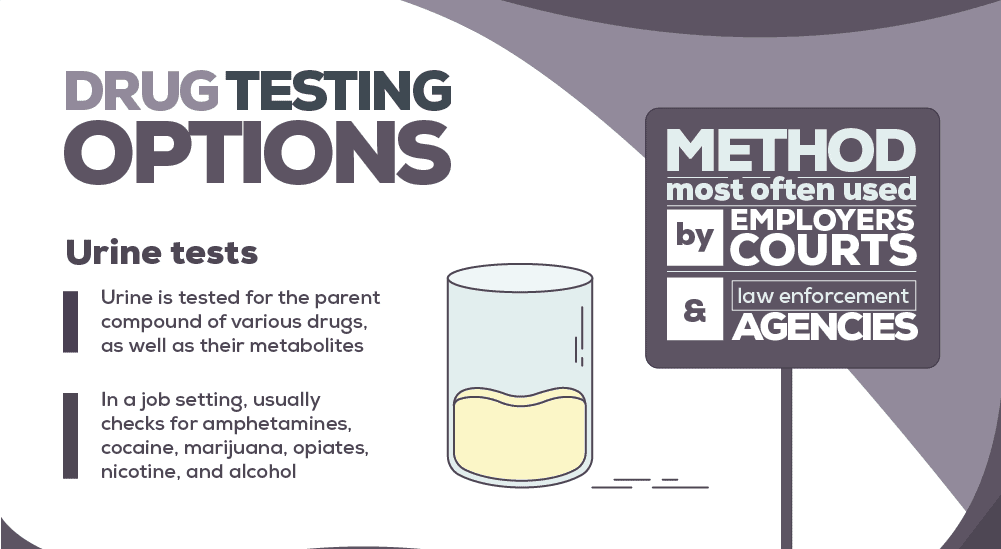
Urine Test
A Urine test or commonly known as a marijuana drug test, is the most common method for detecting THC, especially in employment settings. Urine testing has become standard practice. This method doesn’t measure THC itself but rather THC-COOH, a non-psychoactive metabolite. Urine testing works to detect THC. Most pee tests are performed by collecting a urine sample. Synthetic urine will not pass a test.
- Detection Window: For occasional users, THC metabolites are typically detectable in urine for 1 to 3 days after use. For regular users, this window can extend to 30 days or more, depending on usage patterns and individual metabolism.
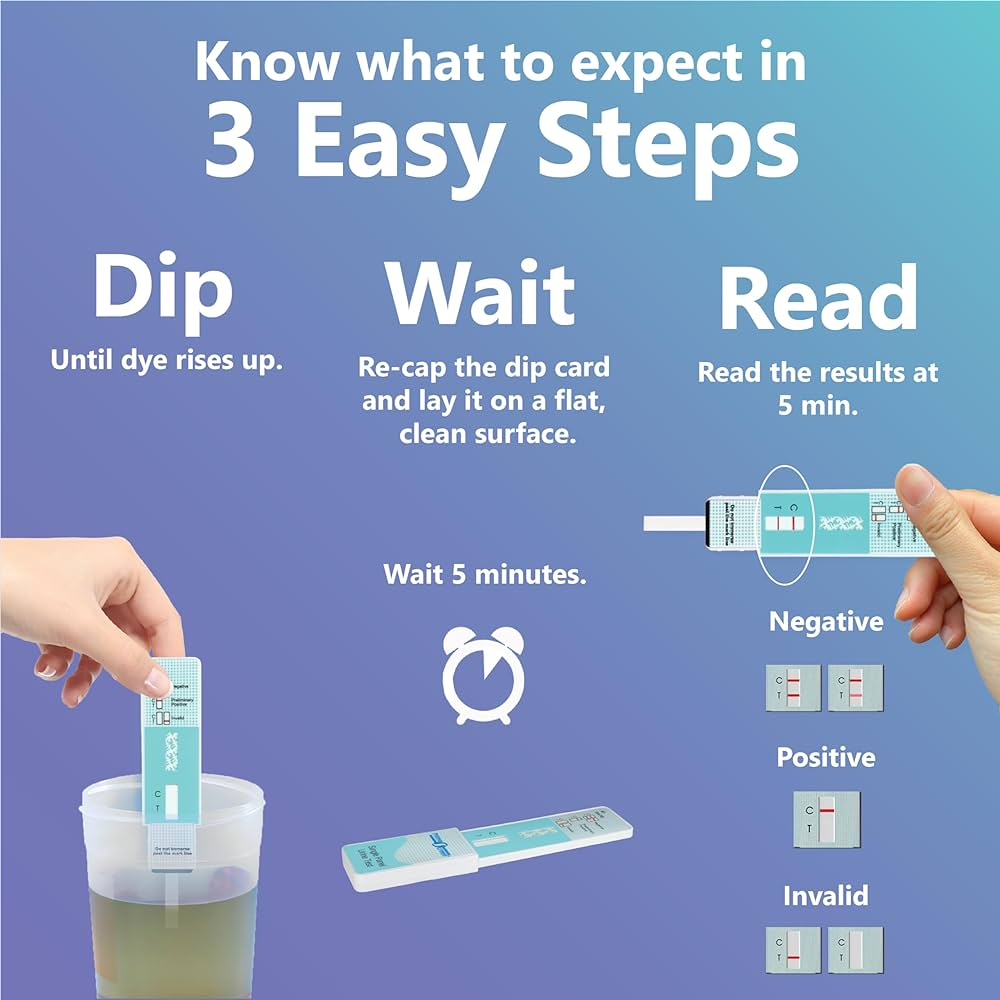
Blood Test
Blood test can measure the presence of active THC and are often used in contexts where impairment is a concern, such as driving under the influence.
- Detection Window: THC is detectable in blood for approximately 3-4 hours for users but can linger for up to a day or more in frequent users. However, because THC metabolites remain in the bloodstream for a shorter duration than in urine, blood tests have a relatively short detection window. Your body mass index can change the influence this process.
Hair Test
A hair test has a unique in its ability to detect drug use over a much longer period. It measures THC metabolites that have entered the hair follicles.
- Detection Window: Drugs can be detected in hair for up to 90 days, sometimes even longer. This method is less commonly used due to its high cost and the longer window of detection, which might not be relevant for all testing purposes.
Saliva Test
Saliva testing is gaining popularity due to its non-invasive nature and ability to detect more recent drug use.
- Detection Window: THC is typically detectable in saliva for about 24 to 48 hours after use, though this can vary based on the frequency of use and the sensitivity of the test.
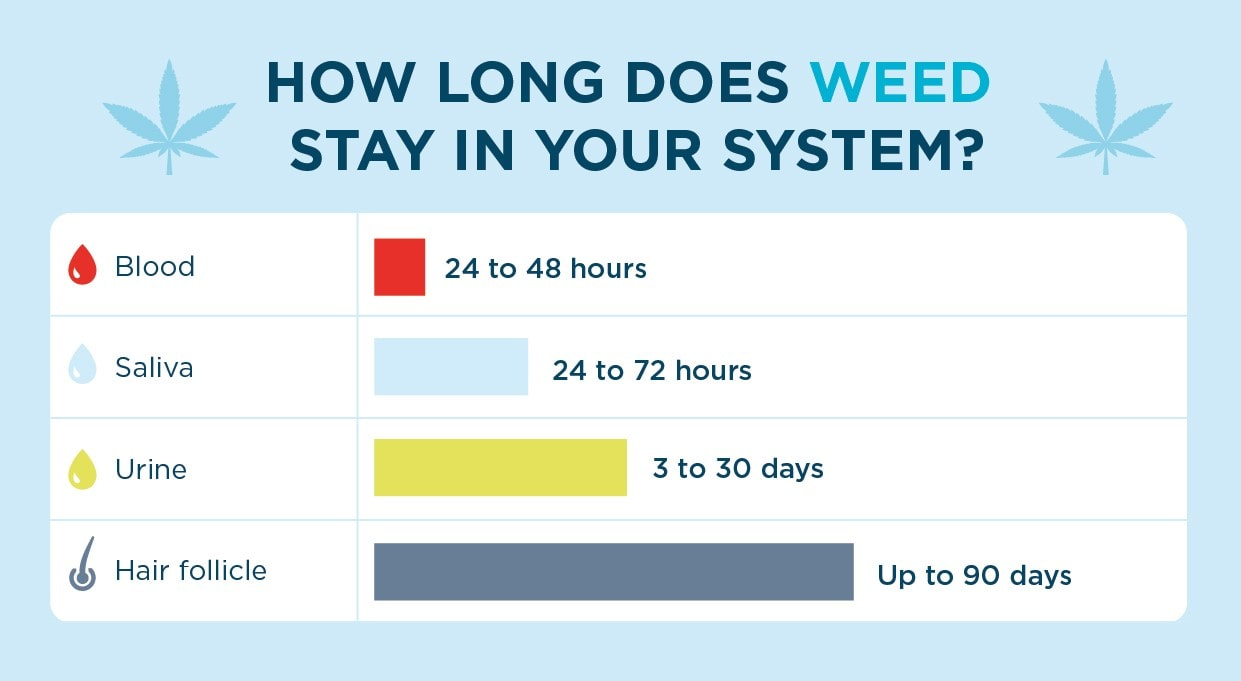
Each drug test method has its strengths and limitations, with varying detection windows that depend on several factors, including the frequency of marijuana use, individual metabolism, and the sensitivity of the drug test itself. Understanding these methods and their specific applications is crucial for anyone concerned about THC detection, whether for legal, employment, or personal reasons. You can not prove marijuana addiction from a positive urine test. You can find great local resources such as the american addiction centers.
Factors Influencing Detection Times
Understanding how long thc will stay in your system is not straightforward; it varies greatly depending on several key factors. Let’s explore these factors in detail to better comprehend their impact on THC detection times.
Frequency of Use
The frequency with which one consumes cannabis plays a significant role in how long THC and its metabolites remain detectable in the body.
- Infrequent Users: Those who use marijuana infrequently typically have shorter detection times. In such individuals, THC may only be detectable for a few days after usage.
- Chronic Users: For regular or heavy users, THC can accumulate in fat tissues, leading to longer detection periods. In these cases, THC could be detectable for several weeks or even longer after the last use.
Body Composition and Metabolism
Since THC is fat-soluble, it tends to bind to fat molecules in the body, affecting how long it stays in your system.
- Body Fat Percentage: Individuals with more body fat may retain THC for longer periods as it takes more time for the body to break down and eliminate the THC stored in fatty tissues.
- Metabolism: A faster metabolism can expedite the breakdown of THC. Factors like age, genetic makeup, activity level, and overall health influence metabolic rate and, consequently, THC clearance.
Hydration and Diet
While not as impactful as other factors, hydration and diet can still influence THC detection times in a drug test.
- Hydration: Adequate hydration can aid in the process to eliminate thc in your system However, excessive water intake in an attempt to ‘flush out’ THC can be harmful and is generally ineffective.
- Diet: A balanced diet, rich in fiber, can assist the digestive system and potentially aid in the faster elimination of THC.
Potency and Type of Cannabis Consumed
The THC content in the cannabis product consumed is another crucial factor.
- Potency: Strains with higher THC concentrations will introduce more of the compound into the system, potentially extending the duration it remains detectable.
- Type of Product: The form in which cannabis is consumed (flower, concentrate, edible, etc.) also affects how THC is metabolized and how long it stays in the system.

These factors collectively determine the length of time weed stays detectable in your system. It’s important to remember that individual experiences may vary significantly due to the interplay of these elements. In the next section, we will delve into the differences in THC retention between occasional and long-term users, offering a clearer picture of how these factors play out in various scenarios.
THC in Occasional vs. Chronic Users
The way THC is metabolized and retained in the body varies significantly between occasional and chronic cannabis users. This distinction is crucial for understanding detection windows and potential implications for drug tests.
THC Retention in Occasional Users
Occasional or infrequent users typically have lower levels of THC accumulation in their bodies due to their sporadic consumption.
- Shorter Detection Windows: Since THC does not have the opportunity to build up significantly in the fat cells of users, it tends to leave the system relatively quickly. In these cases, THC is often detectable in urine tests for 1-3 days post-consumption.
- Lower THC Concentration in Body: The lower frequency of use results in less THC being stored in the body, reducing the duration it remains in the bloodstream or is detectable in saliva or hair tests.
THC Retention in Chronic or Heavy Users
Long term users, those who use cannabis frequently or daily, often experience a different scenario regarding THC retention.
- Longer Detection Windows: In chronic user, THC can accumulate in fat tissues over time, leading to a prolonged presence in the body. This accumulation can result in THC being detectable in urine tests for up to 30 days or more after the last use.
- Higher THC Concentration in Body: Regular use leads to a consistent level of THC in the body, extending the detection period in blood, saliva, and especially hair screenings, where traces of THC can be found for up to 90 days.
Typical Detection Windows for Both Groups
- Urine Tests: weekly users: 1-3 days; Long term users: up to 30 days or more.
- Blood Tests: Generally detectable for a few hours to a day, with a slightly longer window for chronic users.
- Hair Tests: Up to 90 days for both occasional and heavy users, though the concentration might be higher in long term users.
- Saliva Tests: Around 24-48 hours for weekly users, with the possibility of a slightly longer window for consistent users.
The contrast in THC retention between occasional and chronic users underscores the importance of considering individual usage patterns when discussing drug testing and detection times. These differences highlight why there is no one-size-fits-all answer to how long weed stays in a user’s system. Understanding these nuances is key for individuals who might be subject to drug testing or those curious about the implications of their cannabis use. Smoking cannabis is a for a drug screening to detect thc.

Tips to Naturally Flush Out Weed from the System
While the body naturally eliminates THC over time, there’s often interest in methods that might expedite this process. However, it’s crucial to approach this with a clear understanding of what is effective, what’s safe, and what’s merely a myth.
Clarification on Effectiveness and Limitations
It’s important to note that no method can instantly purge THC from the system. The body’s process of metabolizing and eliminating THC is largely determined by individual biology and the factors discussed previously.
Safe and Natural Methods
- Hydration: Staying well-hydrated is vital for overall health and can assist the body’s natural detoxification processes. Drinking water can help to flush out toxins, including THC metabolites, though it won’t dramatically speed up the process.
- Diet: A balanced diet, rich in antioxidants, vitamins, and fiber, can support the body’s metabolism and aid in the elimination of toxins. Foods high in fiber, for instance, can help bind to fat-soluble compounds like THC and facilitate their excretion.
- Exercise: Regular physical activity can boost metabolism, which might help in faster processing and elimination of THC. However, it’s worth noting that exercising just before a drug test could potentially release stored THC from fat cells into the bloodstream.

Warning Against Myths and Unsafe Practices
- Detox Kits and Diuretics: Many products on the market claim to cleanse THC from your system rapidly. These often include diuretics and other substances that can be harmful or ineffective. It’s best to approach these with skepticism and caution.
- Excessive Water Consumption: While staying hydrated is good, drinking excessive amounts of water in an attempt to flush THC can be dangerous and lead to water intoxication.
- Unverified Home Remedies: Various home remedies circulating online lack scientific backing and can be ineffective or even harmful.
The best and safest way to flush THC from the system is by allowing time for the body to naturally metabolize and eliminate it. While maintaining good hydration, a balanced diet, and regular exercise can support overall health, they do not offer a quick fix for THC detoxification. It’s crucial to approach this topic with realistic expectations and a focus on safe, healthful practices.
Legal and Health Considerations
Legal Implications of Testing Positive for THC
The legal repercussions of testing positive for THC can vary greatly depending on the region, the context of the test (such as employment, legal, or medical), and the local laws regarding cannabis use. It’s important to be aware of the following:
- Employment: Many employers require drug tests, and a positive THC result can lead to employment consequences, including not being hired or termination.
- Legal Issues: In regions where cannabis use is illegal or in situations such as driving under the influence, testing positive for THC can have significant legal ramifications.
- Medical Contexts: For certain medical procedures or treatments, disclosing cannabis use is important for ensuring safe and effective care.
It is agaisnt the law to us synthetic urine to try and pass or alter the results of a drug test.
Health Considerations and Potential Side Effects
While cannabis is often used for medicinal purposes, it’s important to be aware of its potential side effects:
- Short-Term Effects: These can include altered senses, mood changes, impaired body movement, difficulty with thinking and problem-solving, and impaired memory.
- Long-Term Effects: Regular, chronic cannabis use can lead to some individuals developing cannabinoid hyperemesis syndrome, issues with brain development when used by adolescents, and respiratory problems if smoked.
Importance of Consulting Healthcare Professionals
For personalized health advice related to cannabis use, it’s essential to consult with healthcare professionals. They can provide guidance based on your health history, current medications, and personal circumstances.
Recap of Key Points
- THC detection times vary widely based on several factors, including usage frequency, body composition, metabolism, and the type and potency of cannabis consumed.
- Different testing methods have varying detection windows, with urine tests being the most common and hair tests having the longest detection period.
- Natural methods to expedite THC elimination are limited in effectiveness, and it’s crucial to avoid unsafe practices.
Emphasis on the Variability of Detection Times
It’s important to remember that THC detection (How Long Weed Stay in Your System) times are highly individual and influenced by many variables. There is no universal timeline for how long weed stays in your system.
Understanding the complexities of THC detection and the factors influencing it is crucial, especially in contexts where legal and employment issues may arise. It is important to consume marijuana responsibly and legally. Being informed and making responsible decisions regarding cannabis use is vital. Remember, when in doubt, seek professional advice and stay updated on the laws and regulations in your area. It is okay if you have ever tested positive for marijuana addiction use.








